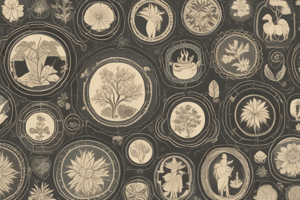Podcast
Questions and Answers
True or false: Naturopathy is a multidisciplinary approach to healthcare founded on a belief in the power of the body to heal itself.
True or false: Naturopathy is a multidisciplinary approach to healthcare founded on a belief in the power of the body to heal itself.
True (A)
True or false: Naturopathy can be traced back to ancient times and shares common ground with systems such as Ayurveda and Traditional Chinese Medicine.
True or false: Naturopathy can be traced back to ancient times and shares common ground with systems such as Ayurveda and Traditional Chinese Medicine.
True (A)
True or false: In naturopathy, symptoms should be suppressed as they are natural physiological mechanisms of detoxification.
True or false: In naturopathy, symptoms should be suppressed as they are natural physiological mechanisms of detoxification.
False (B)
Naturopathic physicians must complete a 4-year, graduate-level program at one of the North American naturopathic medical schools accredited by the Council on Naturopathic Medical Education.
Naturopathic physicians must complete a 4-year, graduate-level program at one of the North American naturopathic medical schools accredited by the Council on Naturopathic Medical Education.
Traditional naturopaths are eligible for licensing.
Traditional naturopaths are eligible for licensing.
Naturopaths may use conventional diagnostic tools such as Chinese tongue and pulse, rebex zones, and iris methods.
Naturopaths may use conventional diagnostic tools such as Chinese tongue and pulse, rebex zones, and iris methods.
The use of additional therapies in naturopathy can be tailored to suit the individual's specific health concerns.
The use of additional therapies in naturopathy can be tailored to suit the individual's specific health concerns.
True or false: Naturopathy is based on the belief that the body can heal itself?
True or false: Naturopathy is based on the belief that the body can heal itself?
True or false: Naturopathy shares common ground with Ayurveda and Traditional Chinese Medicine?
True or false: Naturopathy shares common ground with Ayurveda and Traditional Chinese Medicine?
True or false: Naturopathy is a modern approach to healthcare?
True or false: Naturopathy is a modern approach to healthcare?
True or false: Naturopathy considers all aspects of a patient, including physical, mental, and spiritual?
True or false: Naturopathy considers all aspects of a patient, including physical, mental, and spiritual?
True or false: Symptoms are not the cause of disease but a response by the body to purify itself?
True or false: Symptoms are not the cause of disease but a response by the body to purify itself?
True or false: Naturopathy aims to suppress symptoms in order to treat diseases?
True or false: Naturopathy aims to suppress symptoms in order to treat diseases?
True or false: Naturopathy uses natural modalities to enhance the body's self-healing?
True or false: Naturopathy uses natural modalities to enhance the body's self-healing?
True or false: Naturopathy is only based on the teachings of Hippocrates?
True or false: Naturopathy is only based on the teachings of Hippocrates?
True or false: Naturopathy uses conventional diagnostic tools such as Chinese tongue and pulse?
True or false: Naturopathy uses conventional diagnostic tools such as Chinese tongue and pulse?
True or false: Naturopathy emphasizes the use of additional therapies tailored to individual health concerns?
True or false: Naturopathy emphasizes the use of additional therapies tailored to individual health concerns?
True or false: Naturopathic physicians must graduate from a 4-year naturopathic medical college and pass an examination to receive a license.
True or false: Naturopathic physicians must graduate from a 4-year naturopathic medical college and pass an examination to receive a license.
True or false: Traditional naturopaths are often eligible for licensing.
True or false: Traditional naturopaths are often eligible for licensing.
True or false: Other health care providers can offer naturopathic treatments after pursuing additional training in these areas.
True or false: Other health care providers can offer naturopathic treatments after pursuing additional training in these areas.
True or false: Naturopaths may use conventional diagnostic tools such as Chinese tongue and pulse, reflex zones, and iris methods.
True or false: Naturopaths may use conventional diagnostic tools such as Chinese tongue and pulse, reflex zones, and iris methods.
True or false: The use of additional therapies in naturopathy can be tailored to suit the individual's specific health concerns.
True or false: The use of additional therapies in naturopathy can be tailored to suit the individual's specific health concerns.
True or false: Naturopathy is a multidisciplinary approach to healthcare founded on a belief in the power of the body to heal itself.
True or false: Naturopathy is a multidisciplinary approach to healthcare founded on a belief in the power of the body to heal itself.
True or false: Some therapies used in naturopathy include fasting and detoxification, acupuncture, and homeopathy.
True or false: Some therapies used in naturopathy include fasting and detoxification, acupuncture, and homeopathy.
True or false: Naturopathy can be traced back to ancient times and shares common ground with systems such as Ayurveda and Traditional Chinese Medicine.
True or false: Naturopathy can be traced back to ancient times and shares common ground with systems such as Ayurveda and Traditional Chinese Medicine.
True or false: In naturopathy, symptoms should be suppressed as they are natural physiological mechanisms of detoxification.
True or false: In naturopathy, symptoms should be suppressed as they are natural physiological mechanisms of detoxification.
True or false: Some therapies used in naturopathy, such as those involving excessive heat or cooling, should be avoided in weak patients, during pregnancy, and in liver or kidney disorders.
True or false: Some therapies used in naturopathy, such as those involving excessive heat or cooling, should be avoided in weak patients, during pregnancy, and in liver or kidney disorders.
Which principle of naturopathy is based on the belief in the power of the body to heal itself?
Which principle of naturopathy is based on the belief in the power of the body to heal itself?
Who established the principle that practitioners of naturopathy should 'First do no harm'?
Who established the principle that practitioners of naturopathy should 'First do no harm'?
What is the main cause of disease according to naturopathy theory?
What is the main cause of disease according to naturopathy theory?
What are symptoms considered in naturopathy?
What are symptoms considered in naturopathy?
What is the aim of naturopathy?
What is the aim of naturopathy?
What are the three aspects of a patient considered in naturopathy?
What are the three aspects of a patient considered in naturopathy?
What is the basis for the variety of treatment modalities and diagnosis methods involved in naturopathy?
What is the basis for the variety of treatment modalities and diagnosis methods involved in naturopathy?
What is the belief behind naturopathy?
What is the belief behind naturopathy?
What are some examples of therapies used in naturopathy?
What are some examples of therapies used in naturopathy?
What are the two main principles of naturopathy?
What are the two main principles of naturopathy?
Which type of naturopathic practitioner generally completes a 4-year, graduate-level program at an accredited naturopathic medical school?
Which type of naturopathic practitioner generally completes a 4-year, graduate-level program at an accredited naturopathic medical school?
What organization accredits the North American naturopathic medical schools?
What organization accredits the North American naturopathic medical schools?
Which type of naturopathic practitioner may not be eligible for licensing?
Which type of naturopathic practitioner may not be eligible for licensing?
Which health care providers may offer naturopathic treatments after pursuing additional training?
Which health care providers may offer naturopathic treatments after pursuing additional training?
What diagnostic tools may naturopaths use in addition to a thorough case history?
What diagnostic tools may naturopaths use in addition to a thorough case history?
What is the foundation of naturopathy?
What is the foundation of naturopathy?
Which therapies are used in naturopathy?
Which therapies are used in naturopathy?
What safety considerations should be taken into account in naturopathy?
What safety considerations should be taken into account in naturopathy?
What is the purpose of a thorough case history in naturopathy?
What is the purpose of a thorough case history in naturopathy?
What is the multidisciplinary nature of naturopathy?
What is the multidisciplinary nature of naturopathy?
Flashcards are hidden until you start studying
Study Notes
Naturopathy Definition
- Naturopathy is a multidisciplinary approach to healthcare that believes in the body's ability to heal itself.
- It relies on natural modalities to enhance the body's self-healing power.
Development and General Principles
- Naturopathy's principles are based on the teachings of Hippocrates, who established the principle "First, do no harm."
- Naturopathy has its roots in ancient times and shares common ground with systems like Ayurveda and Traditional Chinese Medicine (TCM).
- The two main principles of naturopathy are:
- Vitalism
- Holism
- There are several systems of naturopathy practiced around the world, but they share a common philosophy of maintaining health by supporting and stimulating the body's natural healing power.
- In naturopathy, all aspects of a patient (physical, mental, and spiritual) are considered.
Disease Concept in Naturopathy
- Disease occurs due to an imbalance in the body, which should be treated in accordance with natural laws.
- The cause of illness should be identified, as symptoms are not the cause of disease but a response to the body's attempt to purify itself.
- Symptoms should not be suppressed, as they are natural physiological mechanisms of detoxification.
Education and Licensure of Practitioners
- There are three types of naturopathic practitioners:
- Naturopathic physicians: complete a 4-year graduate-level program at an accredited North American naturopathic medical school.
- Traditional naturopaths: may receive training in various ways, but are often not eligible for licensing.
- Other health care providers: may offer naturopathic treatments, functional medicine, and other holistic therapies after additional training.
NCCIH Diagnosis
- A thorough case history is taken to identify symptomology.
- Questions asked involve general health and well-being, social circumstances, heredity, and environmental factors.
- Naturopaths may use conventional diagnostic tools and traditional methods like Chinese tongue and pulse, reflex zones, and iris methods.
- The precise nature of the therapy(s) offered depends on patient history and the naturopath's approach.
Treatment
- Naturopathy is a multidisciplinary approach that can make it difficult to determine which facet of care catalyzed the healing process.
- The basic principles of healthy nutrition, exercise, and rest are well established as promoting health and well-being.
- Some therapies used in naturopathy include:
- Fasting and detoxification
- Acupuncture
- Homeopathy
- Hydrotherapy
- Enemas and colonic irrigation
- Hot or cold compresses
- Herbal medicines and nutrition
- Physical therapies like soft tissue massage, electrotherapy, and naturopathic manipulation
Safety Considerations
- Some therapies are used only after careful consideration due to the basic premises of naturopathy.
- Specific therapies involving excessive heat or cooling should be used under the supervision of a professional naturopath and avoided in weak patients, during pregnancy, and in liver or kidney disorders.
- Contraindications to other therapies used in naturopathy should be referred to other health professionals.
Studying That Suits You
Use AI to generate personalized quizzes and flashcards to suit your learning preferences.




